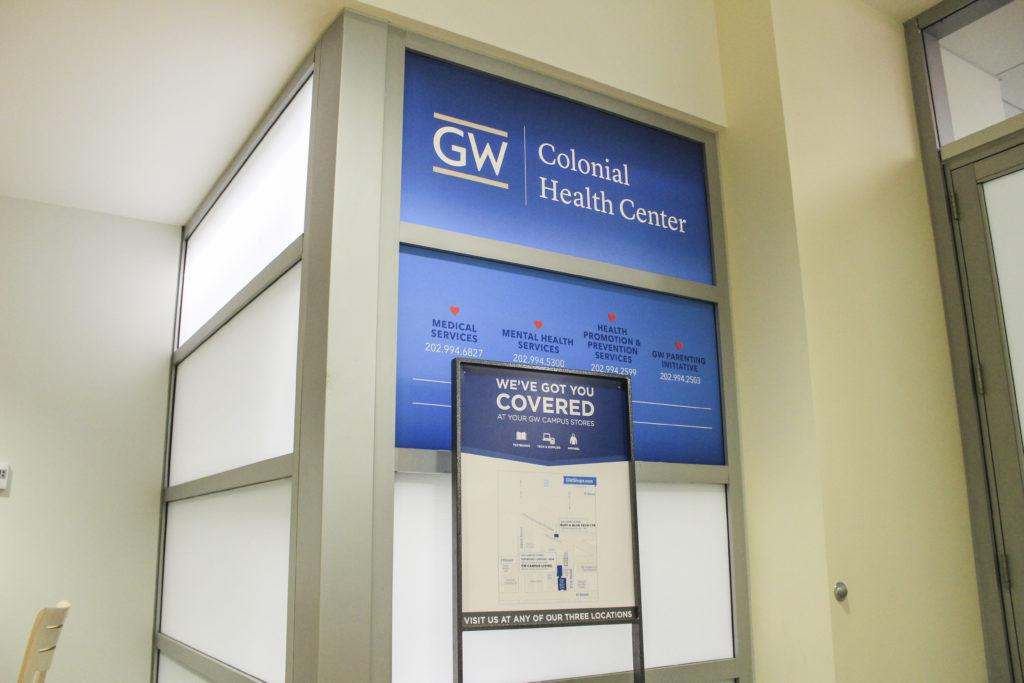A new peer education program designed to address personal health and sexual assault will begin next academic year, officials confirmed last week.
The Colonial Health Center collaborated with the Title IX Office and the Center for Career Services to develop the program, former and current leaders said. Alexis Janda Knott, the associate director of Health Promotion and Prevention Services, said professional staff from CHC will train 21 peer educators this semester to lead prevention workshops and outreach activities.
Those in the GW Peer Education program can participate in one or two areas of focus. Wellness peer educators will focus on mental health, substance use, healthy lifestyle choices and physical health, according to the program’s website. Haven, the University website that brings together on-and-off campus resources for students, peer educators will focus on topics of sexual health, intimate partner violence, gender-based discrimination or violence, stalking and crisis intervention.
“GW Peer Educators work with department staff to provide prevention education to the GW community,” Knott said. “They will do this through workshops, educational campaigns and outreach activities.”
Educators will hold office hours for students, host small group education sessions, monitor the “Ask Haven” e-mail queue and run workshops on health and wellness, according to an archived version of the program website.
A newer version of the site states that students in the program will be responsible for program and event planning, public speaking, networking with student organizations, social media management and developing health promotion campaigns and initiatives.
Training for educators will begin at the end of this month and will take place weekly until the end of the spring semester, Knott said. She added that there will be additional training before the fall semester to prepare students for the program’s launch at the start of the academic year.
University spokeswoman Maralee Csellar said the Title IX office will not cosponsor trainings this semester, as originally planned, and that Health Promotion and Prevention Services will take the lead. Carrie Ross, the former assistant director for sexual assault prevention and response, was initially working on the project but left the University earlier this month.
The new education program is based on feedback from members of the GW community, Ross said in an email last month.
“Peer education is a best practice in fields of public health and violence prevention, and this initiative also reflects the goals and perspectives of GW students, faculty, staff and alumni who participated in focus groups about developing the program,” Ross said.
The program application for students to join the trainings opened on the first day of the fall semester and closed in October. Ross said that students first applied to become educators and went through a screening and interview process before getting approval to join.
After training is complete, peer educators can choose to go through an additional round of training for a Peer Educator Certification through NASPA, the organization for Student Affairs Administrators in Higher Education, Ross said.
This is the second peer program to be introduced at GW in recent years: A peer hotline, which is run through the Student Association, launched this semester after nearly two years of preparation.
The peer education program is not partnering with Students Against Sexual Assault, GW Listens or other student groups that focus on similar topics, but officials are open to working with student organizations in the future, Knott said.
Michaela Stanch, the director of peer education for SASA, said her organization has not been contacted about the program and that group leaders don’t plan to get involved.
“I think that the GW Peer Education Program and SASA’s Peer Education Team are very different, and while they will both attract students who are interested in peer education, SASA will attract students who are more interested in student-run peer education, focusing specifically on sexual violence and the larger mission of SASA,” Stanch said.
This year, SASA trained members to lead peer education trainings, after previously only allowing executive board members to lead workshops. Stanch said SASA trained 10 peer educators this semester who have been leading workshops. Next semester, the group will train 12 more peer educators, she said.
“A peer educator is on an equal playing field as the students in the organization, and this leads to much more honest conversations about sexual violence and our culture on campus, at parties and in residence halls,” Stanch said.
Caroline Heldman, an associate professor of politics at Occidental College who co-founded the organization End Rape on Campus, said upperclassmen should lead peer education programs and receive extensive training, because the topics covered are complicated, sensitive and riddled with misperceptions.
More universities are adding programs on sexual violence awareness and education because of the recent increased dialogue on campuses, Heldman said.
GW implemented mandatory sexual assault prevention education for incoming students in 2015, and later created more individualized options for in-person sexual assault prevention training sessions and added specialized trainings for graduate students.
“We have known about the problem for a very long time, for four decades, and finally colleges and universities are starting to respond because a national movement forced their hand,” Heldman said.
Jayme Trogus, the director of the Center for Health Education and Promotion at Millersville University, said the peer education program there, which began 20 years ago, has enabled students to develop leadership skills and gives student sexual violence survivors a voice.
Trogus said peer educators at her institution complete the 12-hour certified peer educator training through NASPA during the spring semester and receive an additional 40 hours of training prior to the start of each fall semester to present interactive workshops and assist in campus-wide events.
“Peer education has enabled our students to have tough conversations with one another in a more comfortable and inviting manner,” Trogus said.




